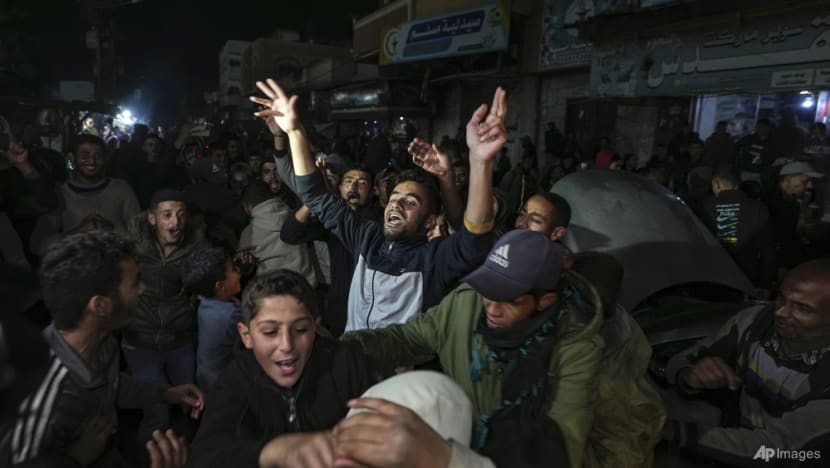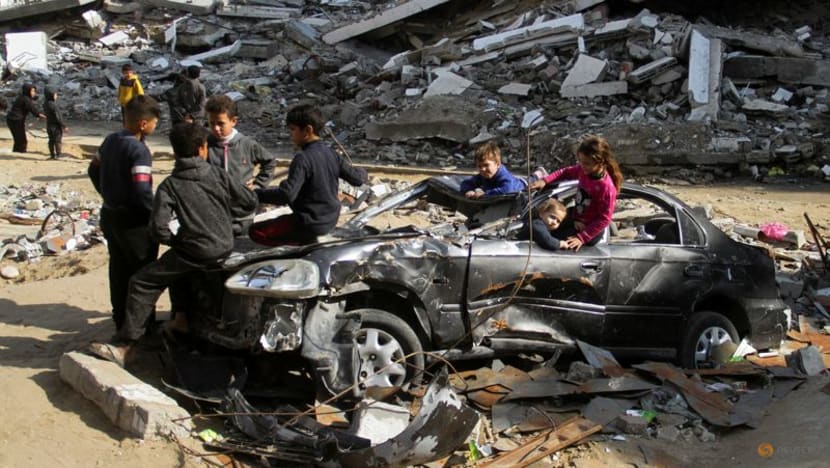UN says priority must be easing Gaza suffering, warns security poses aid challenge

Palestinians celebrate the announcement of a ceasefire deal between Hamas and Israel in Deir al-Balah, central Gaza Strip, Wednesday, Jan. 15, 2025. (AP Photo/Abdel Kareem Hana)
During the 15-month war, Israel has laid to waste much of Gaza and the pre-war population of 2.3 million people has been displaced multiple times. Guterres described the humanitarian situation in the Palestinian enclave as "catastrophic".
"The United Nations stands ready to support the implementation of this deal and scale up the delivery of sustained humanitarian relief to the countless Palestinians who continue to suffer," he told reporters.
"It is imperative that this ceasefire removes the significant security and political obstacles to delivering aid across Gaza so that we can support a major increase in urgent lifesaving humanitarian support," Guterres said.
Critical details of the aid surge are still to be worked out, according to a source familiar with the issue and were due to be discussed in talks in Cairo on Thursday involving the UN, aid groups, governments and others.
The source, speaking on condition of anonymity, said security within Gaza would be the most difficult issue.
"Security is not (the responsibility of) the humanitarians. And it's a very chaotic environment. The risk is that with a vacuum it gets even more chaotic," a senior UN official, also speaking on condition of anonymity, told Reuters. "Short of any arrangement, it will be very difficult to surge deliveries in the short term."

"WE WILL DO WHATEVER IS HUMANLY POSSIBLE"
The deal requires 600 truckloads of aid to be allowed into Gaza every day of the initial six-week ceasefire, including 50 carrying fuel. Half of the 600 aid trucks would be delivered to Gaza's north, where experts have warned famine is imminent.
"We will do whatever is humanly possible, aware of the serious challenges and constraints that we will be facing. We expect our efforts to be matched by other humanitarian actors, the private sector and bilateral initiatives," Guterres said.
For more than a year, the UN has warned that famine looms over Gaza. Israel says there is no aid shortage - citing more than a million tons of deliveries. It accuses Hamas of stealing aid, which Hamas denies, instead blaming Israel for shortages.
Former UN aid chief Martin Griffiths, who stepped down at the end of June, said he was concerned "the stark chaos of Gaza and the criminalization ... is going to impede aid even more."
The United Nations said in June it was Israel's responsibility - as the occupying power in the Gaza Strip - to restore public order and safety in the Palestinian territory so aid can be delivered.
Hamas came to power in Gaza in 2006 after Israeli soldiers and settlers withdrew in 2005, but the enclave is still deemed as Israeli-occupied territory by the United Nations. Israel controls access to Gaza.
The current war was triggered on Oct 7, 2023, when Hamas killed 1,200 people in southern Israel, and took some 250 hostages, according to Israeli tallies. Since then, more than 46,000 Palestinians have been killed, according to Gaza health ministry figures.
















